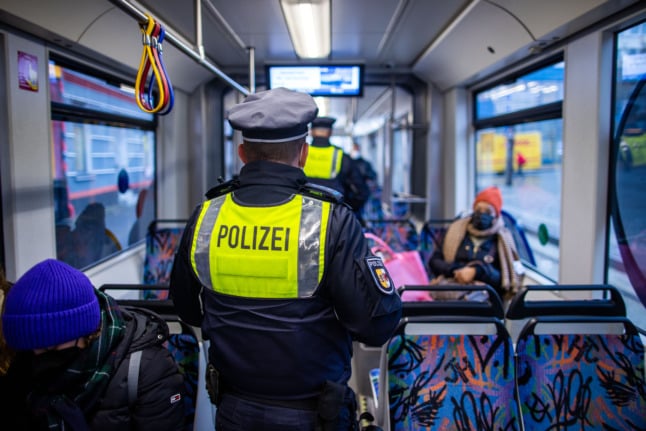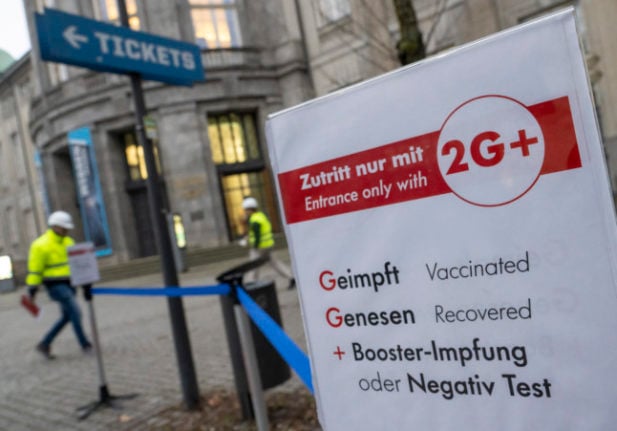In a recent press conference, Saxony-Anhalt state premier Reiner Haseloff (CDU) became the latest figure to state that Germany currently had the strictest Covid measures in the entire world.
Given that the vast majority of businesses remain open to the public and Germany’s Omicron wave is currently less severe than many other countries, this is a bold claim – but Haseloff isn’t the only one to have made it.
As the rules around private gatherings were tightened over Christmas, virologist Klaus Stöhr gave an interview with German daily Welt in which he repeated the claim that the country stood out on the global stage for its hardline Covid measures.
“The measures in Germany are already exceptionally strict,” he told reporters.
The assertion has also gained traction online as people question the need for increasingly tight controls on public life.
But where did this idea originate?
Though not all of the people who’ve made the claim have referenced it directly, the idea that Germany is leading the way in no-nonsense Covid measures is based on the so-called ‘Covid Stringency Index’ that was produced by the University of Oxford.
The index was intended as a means of objectively comparing the responses of governments across the world to the Covid crisis. Using data from around the world, a range of pandemic-fighting measures are categorised and ranked in order to give each country a final score from zero to 100.
A score of zero would apply to a country with no measures whatsoever, while 100 would be the strictest response possible.
As of December 31st, Germany has had a score of 84 on the Index – the highest worldwide. According to researchers, this is due to a range of measures such as restrictions on public transport, closed clubs and compulsory mask-wearing in many areas of public life.
The score puts it above other nations such as China, which is pursuing a tough zero-Covid regime where the briefest of contacts with an infected person can land you in a two-week mandatory quarantine, or France, where a similar health pass system to Germany’s remains in place.
It also puts it above the neighbouring Netherlands, which went into a nationwide lockdown in mid-December involving the closure of schools and many businesses.
READ ALSO: What are the current rules for Swiss cross-border shopping in Germany?
Are things really that strict in Germany?
After feeling the impact of a fierce fourth wave in November and December and bracing for a new wave of Omicron infections in January, Germany certainly has been toughening up its measures in recent months.
Currently, a 3G rule – the need to carry a test or certificate of vaccination or recovery – applies on public transport and in the workplace, meaning people with no immunity have to be regularly tested to go about their daily lives.
In most other public spaces, from non-essential shops to museums, the rules are tightened further to a 2G policy, meaning only vaccinated and recovered people may enter.
Meanwhile, the government has recently opted to tighten up the rules on the hospitality industry so that even fully vaccinated people need a negative test to go and sit in a cafe, bar or restaurant – a system known as 2G-plus. People with booster jabs are exempted from the rules, while unvaccinated people are effectively barred.
READ ALSO: KEY POINTS: Germany’s plans to soften the impact of Omicron
Moreover, people are obliged to wear masks in most public indoor settings, and gatherings are restricted to no more than ten people even if all attendees have some form of Covid immunity.

Nevertheless, it’s worth pointing out that pretty much all areas of public life still remain open in Germany. Vaccinated people can easily enjoy a day out at the shops or a night in a bar with few restrictions, and the vast majority of pupils are still attending school in person.
In many European countries, flashing a Covid health pass of some sort has been part and parcel of residents’ daily lives for several months now. In France and Italy, for example, passengers were expected to show their proof of vaccination or a test on long-distance trains long before Germany introduced its 3G public transport rules.
READ ALSO: EXPLAINED: How Covid ‘3G’ rules could work on German public transport
With this in mind, it’s hard to see how Germany’s rules are stricter than a country like the Netherlands, where hospitality businesses, cultural venues and nonessential shops have been closed since December 19th.
Nevertheless, the Netherlands achieved a score of 64 points on the Index – 20 points less than Germany.
Why does Germany score so highly?
A major reason for the discrepancy between Germany’s place on the Stringency Index and the reality of life for most people in the country is that researchers seem to have based their ranking on the toughest measures in place around the country – even if these were only applied in a local context or for a relatively small group of people.
“If policies vary at the subnational level, the index shows the response level of the strictest subregion,” the Oxford researchers explain on the Index website.
That means that the stringent lockdowns that were implemented in Bavaria and Saxony before Christmas would have been understood as a national standard – even if the vast majority of states in Germany had much fewer restrictions at the time.
Project leader Thomas Hale also explained to Tagesschau that a similar policy applied to ranking restrictions on the unvaccinated.

Given that a 2G or 2G-plus rule – effectively a ban on the unvaccinated – applies in most public indoor spaces, this would once again be ranked as the general rule for Germany, even if it only affects a minority of the population.
The principle of taking the strictest rules has also led to some inaccuracies. For instance, researchers have interpreted Germany’s 3G rule on trains, buses and trams as public transport being closed or off-bounds for most of the population.
Defending the research in Tagesschau, Hale warned against trying to interpret too much from the rankings.
“The Covid Stringency Index should be understood as a simple summary of the number and intensity of restrictions in place,” he said. “It merely indicates which countries have stricter policies – for the unvaccinated.”



 Please whitelist us to continue reading.
Please whitelist us to continue reading.
Nothing says freedom like ranking above a communist country in the stringency tables.
Living in Germany feels like living in a police state
Probably you have no idea on what it means to live in a police state
Have these guys ever been to China, South Korea and such?
The Germans really have nothing on them in terms of covid measures and strict lockdowns/quanrantine
It’s the usual scene of “how the statistics are compiled and then how they are interpreted”.
I’ve found that wearing a mask (with my prescription glasses) is an absolute p.i.t.a., other than that, daily life in Germany is just fine and dandy : ))
I find the rules telling me what to wear absolutely abhorrent. I don’t feel safer with a government that can wield such power upon its citizens, I’m more afraid of the government than I am the virus. As for daily life, Many people are consumed by fear. you can see it in their eyes. 2g never made them safe nor will 2g+ . This is the thin end to a very big wedge, soon even China will be jealous of the control our government has.
Life is fine and dandy here as long as you follow the rules handed down by our dear leader.
If not your shut in and shut out until you comply.
All governments have similar powers and rules. If you don’t like them, vote for a change of government and then you’ll find out how impossible it actually is to change any rules!
In essence, they are in power over us plebs until the next war takes them out. An alternative to following any rules is to work out for yourself how to either ignore them or sidestep their effect and then keep the info to yourself.
Most governments gave themselves these powers at the start of this pandemic. I would love to change them out. I hope that if there’s another election that Scholz is gone.
Would never call yourself a pleb. Thats accepting they are mightier than the people. (If 80 million people refused to wear their masks what could they do? Can’t arrest the entire population. I also accept its likely thats never going to happen). But Change can only come from working with the system. Not being apart from it.
“When government fears the people, there is liberty. When the people fear the government, there is tyranny.”
I am currently in Vienna and feel like the rules here are more stringent, but understanding the rules is much easier…in my opinion at least. Vaccination mandate to be in place next month…….